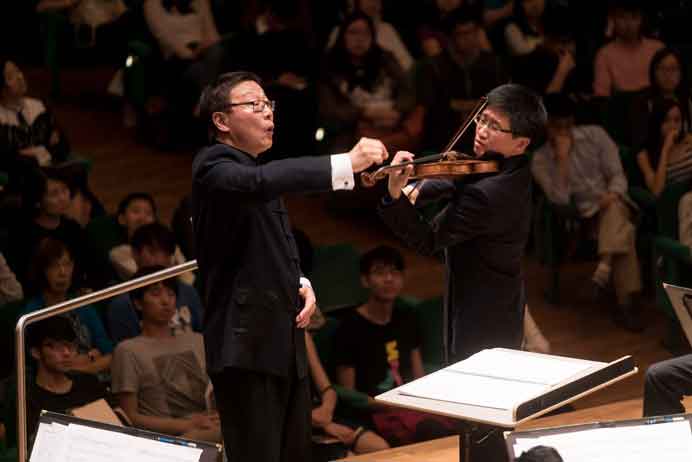| |
|
| |
|
| |
Bright Sheng 盛宗亮 pinyin Sheng Zongliang
|
| |
|
|
1955
|
Bright Sheng 盛宗亮 was born on December 6 in Shanghai China.
|
|
|
He studied piano, from the age of four, with his mother.
|
| |
|
|
|
He was sent to Qinghai during the Cultural Revolution.
|
| |
He stayed there for seven years, during which he played piano and percussions
|
| |
and studied the region's folk music.
|
| |
|
|
1978
|
He was admitted to the Shanghai Conservatory and studied composition.
|
|
|
|
|
1982
|
He left to join his family in New York United States..
|
| |
|
|
|
He attended Queens College.
|
| |
Graduated with a Master, he continued his studies at Columbia University
|
| |
and obtained a Doctorate in Musical Arts.
|
|
1995
|
He was a Professor at the University of Michigan.
|
| |
|
|
* * *
|
|
*
|
| |
|
| |
Opera and theater composer
|
| |
|
|
1992
|
- The Song of Majnun, an opera in one act with an English libretto by Andrew Porter
|
|
|
For this first opera, a Persian tale in one act, he used Tibetan folk melodies.
|
| |
|
|
1997
|
- Silver River, a musical theater in two acts with a libretto by David Henry Hwang.
|
|
2003
|
- Madame Mao an opera in two acts commissioned and premiered by the Santa Fe Opera.
|
|
2016
|
He presented an opera in two acts in English at the San Francisco Opera House :
|
|
|
- A Dream in the Red Mansion, with a libretto by David Henry Hwang and Sheng, based on
|
| |
a Chinese novel by the 18th-century writer : Cao Xueqine -
|
| |
- Conductor Jaap van Zweden Hong
Kong
|
| |
- Hong Kong Philharmonic Orchestra.
|
| |
This work will tour China the following year.
|
| |
|
|
1999
|
Commissioned by the White House for the visit of Chinese Prime Minister Zhu Rongji,
|
| |
he wrote - Three Songs for Yo-Yo Ma and Wu-Man.- cello and pipa .
|
| |
(three popular melodies inspired by his childhood).
|
| |
|
|
2006-2008
|
He was appointed the New York City Ballet's first composer-in-residence.
|
| |
He collaborated with choreographer Christopher Wheeldone on the new ballet :
|
| |
The Nightingale and the Rose.
|
|
|
He collaborated with Ballet Master Peter Martins, for the new ballet : Just Dance.
|
| |
|
|
2008
|
He composed the music for the opening ceremony of the Beijing Olympic Games.
|
| |
|
| |
- A chamber music composer, he has composed with:
|
| |
The Emerson Quartet - The St. Petersburg Quartet
|
| |
The Shanghai Quartet - The Tachacs Quartet
|
| |
He participated in numerous festivals:selection
|
| |
- La Jolla Summer Chamber Music Festival
|
| |
- Santa Fe Chamber Music Festival
|
| |
- Bowdoin International Summer Festival
|
| |
|
|
* * *
|
|
*
|
| |
|
| |
- As a conductor, he performed with the greatest orchestras:
|
| |
|
| |
Detroit Symphony Orchestra - New York Chamber Symphony Orchestra
|
| |
San Francisco Symphony Orchestra - Seattle Symphony Orchestra
|
| |
Shanghai Symphony Orchestra - National Symphony Orchestra of China
|
| |
|
| |
Dortmund Philharmonic Orchestra
|
| |
the Hong Kong Philharmonic Orchestra
|
| |
the Saint Petersburg Philharmonic Orchestra
|
| |
|
| |
- A concert pianist, he performed at Carnegie Hall, the Kennedy Center -
|
| |
the Lincoln Center for the Performing Arts.
|
| |
He won the Pulitzer Prize for his work on Four Movements for Piano Trio.
|
| |
|
| |
- He records for the following labels: : Decca - Delos - Koch International - Naxos -
|
|
|
New World - Telarc - Sony Classical.
|
|
|
- His music is published exclusively by: G. Schirmer, Inc.
|
| |
|
|
|
He lives in New York United States. |
|
|
|
| |
Daniele Sicard |
| |
|
|
•
|
| |
|
| |
Awards selection
|
| |
|
|
|
1985
|
Mac Arthur Fellowship
|
|
|
1988
|
Pulitzer Prize 1st Runner-up
|
Hun (Laceration) orchestral composition
|
|
1990
|
Bourse John Simon Guggenheimm
|
|
|
1991
|
1rst Finalist - Pulitzer Prize
|
Four Movments for Piano trio
|
|
2003
|
Appointed Professor Emeritus
|
Leonard Bernstein University
|
| |
|
|
|
|
•
|
| |
|
|
|
|
|
|
| |
|
•
|

![]()